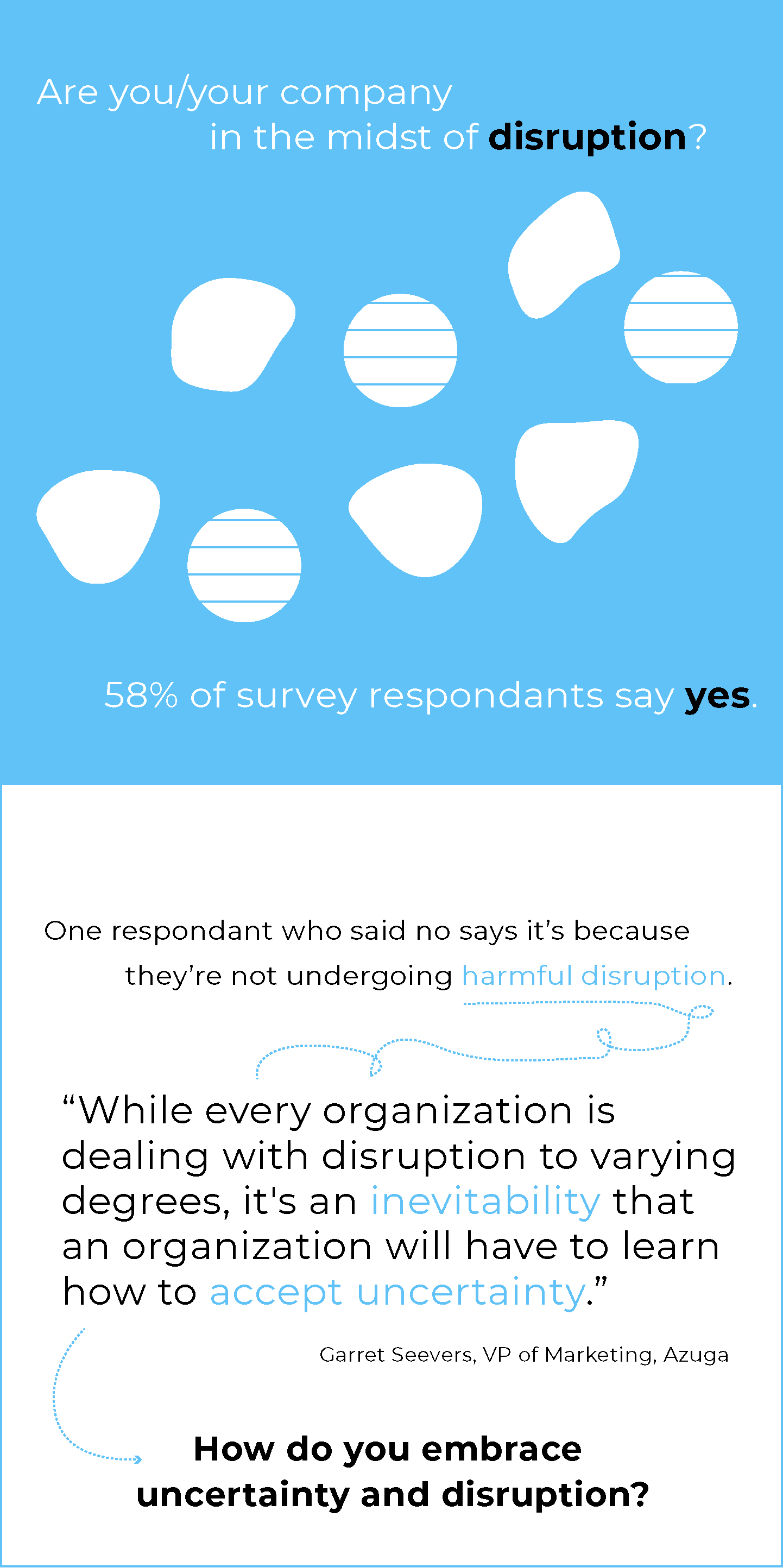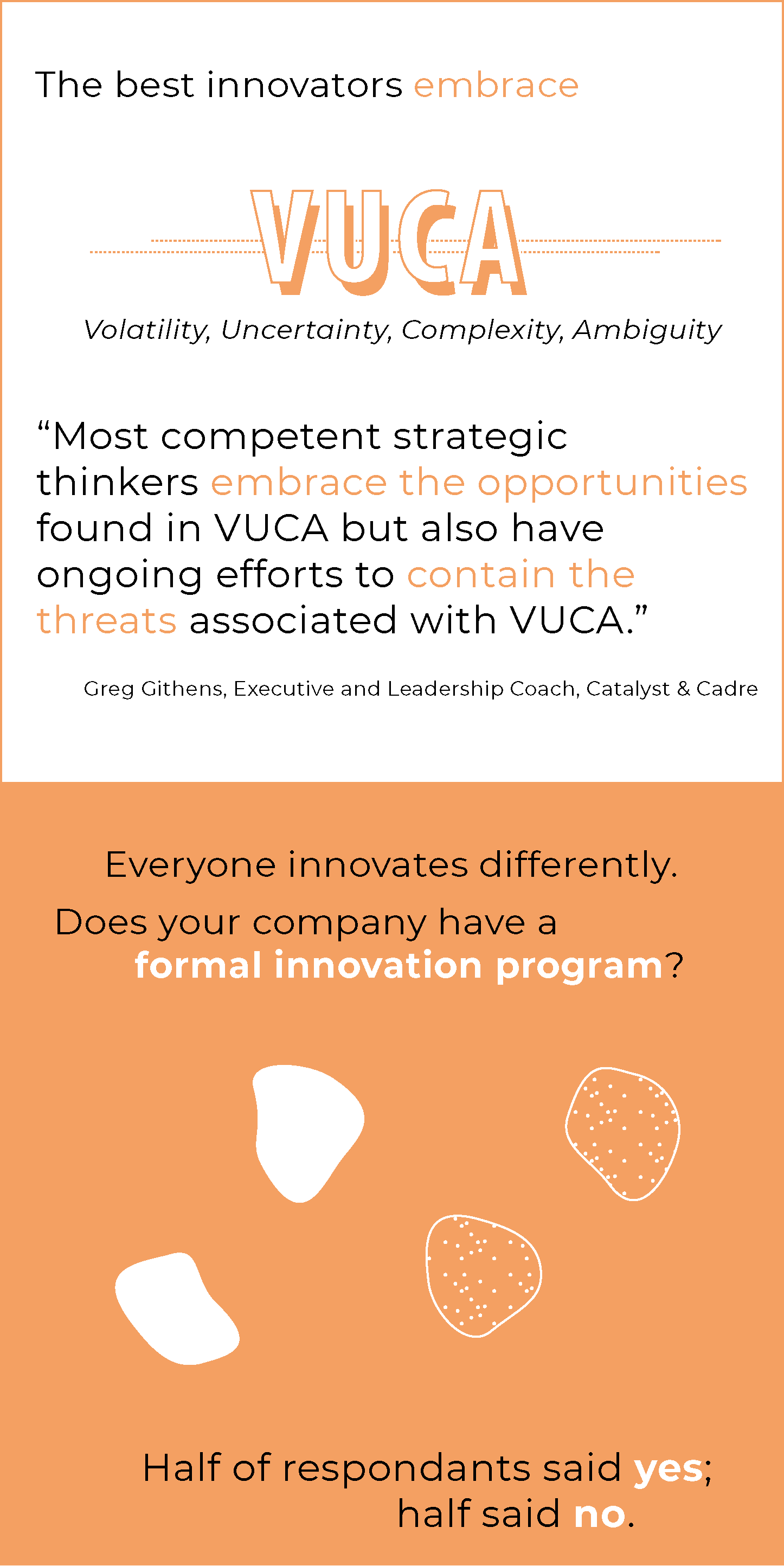Brought to you by Human Resources Today and Business Innovation Brief
We’re all familiar with major disruptors: Uber, Airbnb, DoorDash, Tesla, Apple, and many others that have toppled competitors in their industries. These companies are able to disrupt thanks to innovating and thinking outside the norm... and in some cases, outside the existing regulations.
But how do you prepare for the uncertainty of disruption?
Disruption is everywhere in today’s corporate ecosystem. It’s how you react to it that will make or break your business. Sometimes, when a company finds that a competitor or a new startup has found a new way of attracting and satisfying customers, their first reaction is not jumping for joy about how they can also benefit and grow from this new strategy. Instead, their first reaction is fear — the innovators become the enemy.
But is disruption the enemy? Or is the inability the real culprit here?
The acronym VUCA (volatility, uncertainty, complexity, ambiguity), originally used in military education, is an increasingly popular term for organizations tackling disruption head-on. Successful innovators are simply adapting and responding to this increasingly VUCA world.
With this in mind, we asked a few professionals familiar with the business of innovating some questions about their companies and how they react to disruption (if they’re experiencing it at all).

Garret Seevers, VP of Marketing at Azuga, tells us he doesn’t feel that Azuga is in the midst of harmful disruption. What makes this particular disruption helpful, rather than harmful? He tells us it’s because of the “inevitability that an organization will have to learn how to accept uncertainty.” When you accept and plan for uncertainty, you can skip the initial surprise and fear, and jump straight to considering how that disruption may be helpful.
As a matter of fact, Sandeep Bansal of Marketing Intelligence Team, assured us that, “if a business is not constantly disrupting in its own little ways, it is technically marginalizing itself, ultimately leading towards obscurity.” By making small modifications from within, a company can be ready for bigger outside disruptions.
We also heard from Jennifer Eggers, President of LeaderShift Insights, and her thoughts about preparing for change and uncertainty. She ultimately believes that it “is entirely possible to build resilience before disruption hits.” She told a story of one memorable time when an organization best prepared for change: a national retail company was experiencing an unexpected inability to open enough new stores to drive the lift in revenue they had committed to. But although this was a difficult situation, this leadership team did the resilience work ahead of time to ensure that their structure, incentives and 'plan B's' were in place long before they needed them.
“Because of this,” Jennifer recalled, “there was no wasted time or finger pointing when a shift was required. Marketing ran promotion, HR accelerated in-store training, Supply Chain found savings and at the end of the year, bonus paid out at 100% to every single employee.”
The leadership team in question did a wonderful job preparing for an internal adjustment to address a large potential problem with their revenue sources. But facing down uncertainty doesn’t have to rest on the shoulders of individual leaders; the challenges of disruption may also be addressed through a formal innovation program that anticipates industry upheavals that can affect the company.
While a formalized innovation program can definitely help prepare for change and uncertainty, sometimes simply accommodating innovative thinking leads to positive results. For instance, Jake Penney, Head of HR at English Blinds, told us that his company doesn’t have a formal program, but they “do have very pro-innovation workplace culture. [They] actively encourage employees at all levels to brainstorm, think outside of the box, and come to [them] with ideas, suggestions and models, and ensure that those that do are rewarded accordingly and always appreciated.”
Simply preparing and anticipating change - with or without a formal innovation program - is a necessity with VUCA. In an increasingly changing world, learning how to navigate all that comes along with VUCA is key. As Greg Githens, an experienced executive and leadership coach, assures us: “Most competent strategic thinkers embrace the opportunities found in VUCA but also have ongoing efforts to contain the threats associated with VUCA.”

It can be difficult to fully embrace the opportunities in VUCA while also bracing yourself against threats that may arise because of it. The ability to do both starts with skilled leadership; if leading innovation is a necessity, then leading innovation amidst uncertainty is crucial. Without the correct mindset to address the uncertainty brought on by disruption, and without working to incorporate a culture of innovation, you run the risk of falling behind, as Sandeep Bansal warned us.
If you find yourself struggling to operate sensibly and proactively in a VUCA world, join us and Janet Sernack, an ICF ACC accredited executive coach, corporate trainer, group facilitator and culture and change consultant, on November 26 at 2:30pm PST/5:30pm EST to understand how developing an innovation coaching skill set can help lead the way in supporting people through the exponential change and disruption.








Let's personalize your content